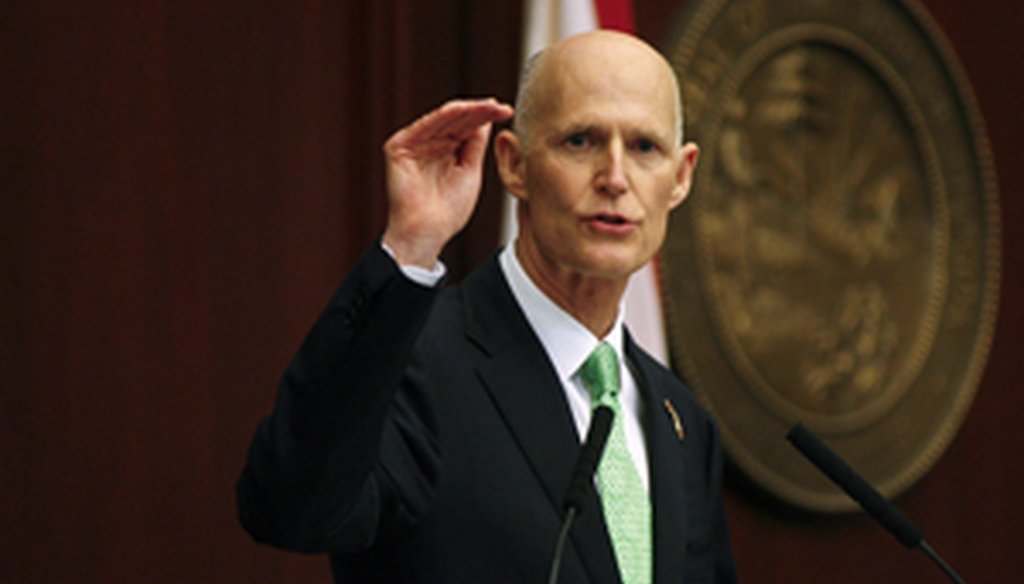Stand up for the facts!
Our only agenda is to publish the truth so you can be an informed participant in democracy.
We need your help.
I would like to contribute

Rick Scott talked about job creation, education and tax cuts during his fourth State of the State address in Tallahassee on March 4, 2014. (AP photo)
Gov. Rick Scott’s fourth State of the State address before the Florida Legislature on Tuesday focused on tax cuts and job growth during his term, spinning some of the facts to put his term in the best light.
Contrasting his tenure with former Gov. Charlie Crist (his presumptive rival in this fall’s gubernatorial election), Scott claimed he had fulfilled his key 2010 campaign promises to curb spending and help employment rebound. He also touted the state’s education system.
PolitiFact Florida decided to take a look at some of the issues he highlighted to see how they rated on the Truth-O-Meter. (You can watch the speech here.)
During his administration, Floridians have enjoyed quite a bit of tax relief, Scott said. "Together, we have cut taxes 24 times already," he told the joint session of the Legislature.
This isn’t the first time the governor has boasted of two-dozen tax cuts; Scott told the Wall Street Journal the same thing in May 2013. Defining what counted as a tax cut as anything that reduced government revenue $3 million per year or more, Scott’s office provided PolitiFact Florida with a list of the 25 -- not 24 -- tax sources to which he was referring. (We asked Scott’s office if there had been additions to the list since last May, and they told us no.)
Sign up for PolitiFact texts
There was quite a bit of spin on that list, however. Among the items listed were sales-tax holidays, which were counted four times for the three years they were held; corporate tax exemptions; tax credit scholarships (which give breaks to businesses); and reduced unemployment compensation taxes.
The caveats for those examples is that they disproportionately benefitted business and were often tax credits instead of tax cuts. People who aren’t business owners haven’t seen anything like 24 tax cuts. We rated the statement Half True.
During the speech, Scott also recalled his pledge use seven steps to bring 700,000 jobs to the state over seven years, above and beyond the 1.05 million jobs economists predicted would be created no matter who was in office. His 7-7-7 plan is a campaign promise we’ve been tracking on the Scott-O-Meter. "We have added almost half a million jobs in three years," Scott said Tuesday.
As of December 2013, Florida had added 406,000 jobs since January 2011. Scott has several years left to try to achieve 700,000 new jobs, we’ve rated his promise In the Works.
Scott also repeated a line from last year’s State of the State, saying "Florida’s economy was driven into the ground by spending" and "racked up big debt." His administration has been focused on changing those habits, in order to bring the state’s economy back up to full speed.
We checked that one last year, and economists told us that runaway government spending was not the problem. The real estate crash, the Great Recession and withering construction and tourism industries were really to blame. We rated Scott’s claim False.
Scott turned to education milestones in the speech, crowing that "Florida high schools are four out of the top 10 in the entire United States." He was referring to the May 2013 rankings by Newsweek, which named the International Baccalaureate School at Bartow High in Bartow; the School for Advanced Studies in Miami; Riviera Beach’s Suncoast Community High School; and Stanton College Preparatory School in Jacksonville among its top 10.
When we asked some experts about the rankings, they mentioned numerous problems with any list like this in general, and Newsweek’s specifically. For one, the data was self-reported from only about 2,500 of the 20,000 high schools in the country, and wasn’t properly interpreted.
Not only that, different sets of rankings yield different results. None of those four schools appeared in the U.S. News and World Report’s top 10, for example. In fact, in many rankings, Florida schools don’t fare well at all. We rated the statement Half True.
The governor also boasted of the state’s public colleges answering the challenge to create affordable degree programs. "I’m proud that all of our four-year state colleges now offer bachelor’s degrees for only $10,000."
In November 2012, Scott challenged the four-year schools in the Florida College System to bring down the cost of tuition in higher demand fields. He asked the system to create programs that would charge $10,000 for a degree.
Twenty-three schools and a community college answered the call and agreed to create programs, but only 10 began enrolling students in a few specific fields of study in the fall 2013 semester, with three more on track to begin in spring 2014. The costs also only pertain to tuition, and not any other expenses, such as books or room and board. We rated the claim Mostly False.
Our Sources
For complete source list, see individual fact checks.































